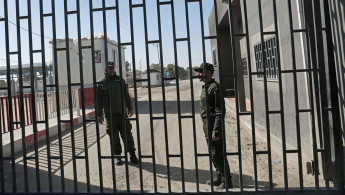Israel tightens Gaza siege with closure of goods crossing
Israel has closed its only goods crossing with the Gaza Strip, as part of punitive measures announced by Israel's military on Monday.
In a statement, the army said that the decision to shut down the Kerem Shalom crossing was made in order to prevent "additional terror attempts".
"The crossing will be closed except for humanitarian equipment (including food and medicine) that will be approved on an individual basis," the Israeli military said in a statement.
"No exports or marketing of goods will be carried out from the Gaza Strip," it added, saying that the move was also due to "additional terror attempts," referring to alleged infiltrations and other incidents along the Gaza border.
Kerem Shalom will now remain closed until further notice.
The closed crossing is the only one between Gaza and Israel for goods transport and will add further pressure to the already-besieged Gaza Strip. A separate crossing, known as Erez, is used for people.
Israel strictly controls both crossings and has enforced a siege on Gaza since 2007, shortly after Islamist group Hamas took control of the coastal strip.
UN officials and rights activists have repeatedly called for Israel to lift the blockade against Gaza, citing deteriorating humanitarian conditions.
Gazans began launching burning kites across the border into Israel in April amid mass protests calling for Palestinian refugees to be able to return to their former homes now inside Israel.
A spokesman for Israel's fire service says 750 fires have burned 2,600 hectares, putting the damage at millions of shekels (hundreds of thousands of dollars/euros).
Since protests and clashes broke out along the Gaza border on March 30, at least 139 Palestinians have been killed by Israeli fire.
No Israelis have been killed.
On Sunday, a Qatari diplomat mediating to resolve tensions on the Israel-Gaza border suggested that allowing Gazans to work in Israel could quell the unrest.
In an interview with Israeli public broadcaster Kane, Mohammed al-Emadi floated the idea of allowing 5,000 Palestinians from Gaza to obtain work permits for Israel.
"It could start for example with 5,000 people in Gaza who would work in Israel. That is good. That would stop the protests, the fires, the kites and the balloons," Emadi said.





 Follow the Middle East's top stories in English at The New Arab on Google News
Follow the Middle East's top stories in English at The New Arab on Google News

![MP Essam Diab's pursuit to block TikTok in Egypt has revived an already ongoing debate in the country. [Getty]](/sites/default/files/styles/image_330x185/public/1230748046.jpeg?h=a5f2f23a&itok=-8MqBLLC)
